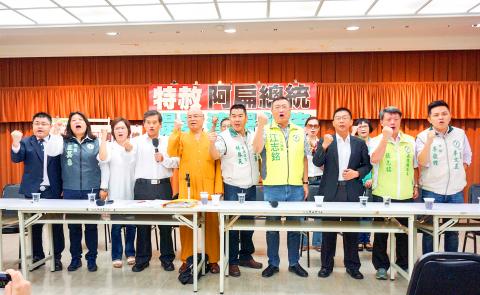The Local Council Alliance for A-bian’s Amnesty yesterday said that 85 percent of its members have signed a petition in favor of former president Chen Shui-bian’s (陳水扁) pardon.
“A-bian” is Chen’s nickname.
There are 505 valid signatures, meaning that 85 percent of the 591 active Democratic Progressive Party (DPP) representatives have signed, said Kaohsiung City Councilor Hsiao Jung-ta (蕭永達), who also signed the petition.

Photo: CNA
Hsiao said he is confident Chen will be pardoned, since the DPP is the governing party and it is clear from the number of signatures that the party supports it.
Chen’s contributions far outshadow his crimes and the resources he left behind for the DPP outweigh the debt, he added.
Another supporter, Taipei City Councilor Chiang Chih-ming (江志銘), called Chen’s case a political one disguised as a legal case and urged President Tsai Ing-wen (蔡英文) to pardon the former president.
The Presidential Office said that the decision is the right and duty of the president, not of any political party or civil organization.
The administration will not make a decision based on the opinions of party members, Presidential Office spokesman Alex Huang (黃重諺) said.
Tsai, who also serves as DPP chairperson, will make her decision based on proper legal proceedings rather than on the opinions of the party, even though it is the governing party, Huang said.
The administration understands the signatories’ opinions, but believes that everyone will respect the president’s right to make the decision based on the Constitution, he added.

Taiwanese can file complaints with the Tourism Administration to report travel agencies if their activities caused termination of a person’s citizenship, Mainland Affairs Council Minister Chiu Chui-cheng (邱垂正) said yesterday, after a podcaster highlighted a case in which a person’s citizenship was canceled for receiving a single-use Chinese passport to enter Russia. The council is aware of incidents in which people who signed up through Chinese travel agencies for tours of Russia were told they could obtain Russian visas and fast-track border clearance, Chiu told reporters on the sidelines of an event in Taipei. However, the travel agencies actually applied

Japanese footwear brand Onitsuka Tiger today issued a public apology and said it has suspended an employee amid allegations that the staff member discriminated against a Vietnamese customer at its Taipei 101 store. Posting on the social media platform Threads yesterday, a user said that an employee at the store said that “those shoes are very expensive” when her friend, who is a migrant worker from Vietnam, asked for assistance. The employee then ignored her until she asked again, to which she replied: "We don't have a size 37." The post had amassed nearly 26,000 likes and 916 comments as of this

US President Donald Trump said "it’s up to" Chinese President Xi Jinping (習近平) what China does on Taiwan, but that he would be "very unhappy" with a change in the "status quo," the New York Times said in an interview published yesterday. Xi "considers it to be a part of China, and that’s up to him what he’s going to be doing," Trump told the newspaper on Wednesday. "But I’ve expressed to him that I would be very unhappy if he did that, and I don’t think he’ll do that," he added. "I hope he doesn’t do that." Trump made the comments in

Tourism in Kenting fell to a historic low for the second consecutive year last year, impacting hotels and other local businesses that rely on a steady stream of domestic tourists, the latest data showed. A total of 2.139 million tourists visited Kenting last year, down slightly from 2.14 million in 2024, the data showed. The number of tourists who visited the national park on the Hengchun Peninsula peaked in 2015 at 8.37 million people. That number has been below 2.2 million for two years, although there was a spike in October last year due to multiple long weekends. The occupancy rate for hotels